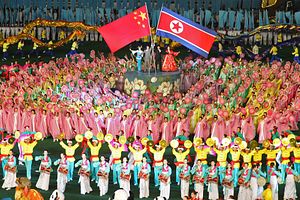It has been three and half years since North Korean leader Kim Jong-un rose to power, a period that has seen a chill in the China-North Korea relationship.
However, the current estrangement between China and North Korea may be the new normal, rather than an abnormality. Over the previous decades, the superficial affinity between these two neighbors made for a fruitful bilateral relationship, but ties remained frail and complicated by regional and global politics. That more positive relationship was understandable, but not quite normal.
During the heyday of the Cold War, Pyongyang fully mobilized its delicate (and successful) strategy of diplomatic maneuvering between the former Soviet Union and China in the Mao Zedong era. North Korea’s alliance treaties with both Moscow and Beijing are proof of this. In general, this period saw a triangle formed by China, North Korea, and the Soviet Union — sometimes an equilateral one, but quite often leaving one leg of the triangle shorter than the other. By following the changing political climates between its bigger and stronger neighbors, North Korea successfully secured national strategic gains, including political support, economic aid, and military protection, through a number of means from both China and former Soviet Union.
In the early 1990s, though, geopolitical shifts inevitably brought fundamental changes to China-North Korea relations. China’s reform and opening up and the establishment of diplomatic relations between Beijing and Seoul alienated China and North Korea, two close neighbors that previously fought side-bye-side on the battlefield. However estranged they became, both sides subtly worked together to maintain a unique and adequately close relationship.
Some academics and media outlets have used the logic of a “buffer zone” to explain China’s North Korea policy in recent years — specifically, to explain why China hasn’t abandoned North Korea. But this doesn’t get at the substance of China-North Korea relations. China’s ties with North Korea are based on political or even ideological traditions and postures. In fact, for North Korea, it is China that acts more like a buffer zone: a political, economic, military, and diplomatic shield between North Korea and the international community, and particularly the United States. China sometimes even has to take the blame or pay the price for North Korea’s inappropriate and unacceptable behavior, even acts that Beijing did not necessarily intend to accept or tolerate.
In the bigger picture, the China-U.S. relationship of course plays a more crucial role, and the present de facto Sino-U.S. competition may have helped to shape China’s complicated mindset toward North Korea.
Now, certain changes (though not necessarily fundamental ones) are expected in the China-North Korea relationship. The current coldness may be sending the message that China’s kindness and tolerance come with a price. The price is North Korea’s compromise and cooperation, which Pyongyang may find unacceptable. And once again, we see the triangle of China, North Korea, and Russia becomes unequal again as Moscow and Pyongyang move carefully closer to each other.
































